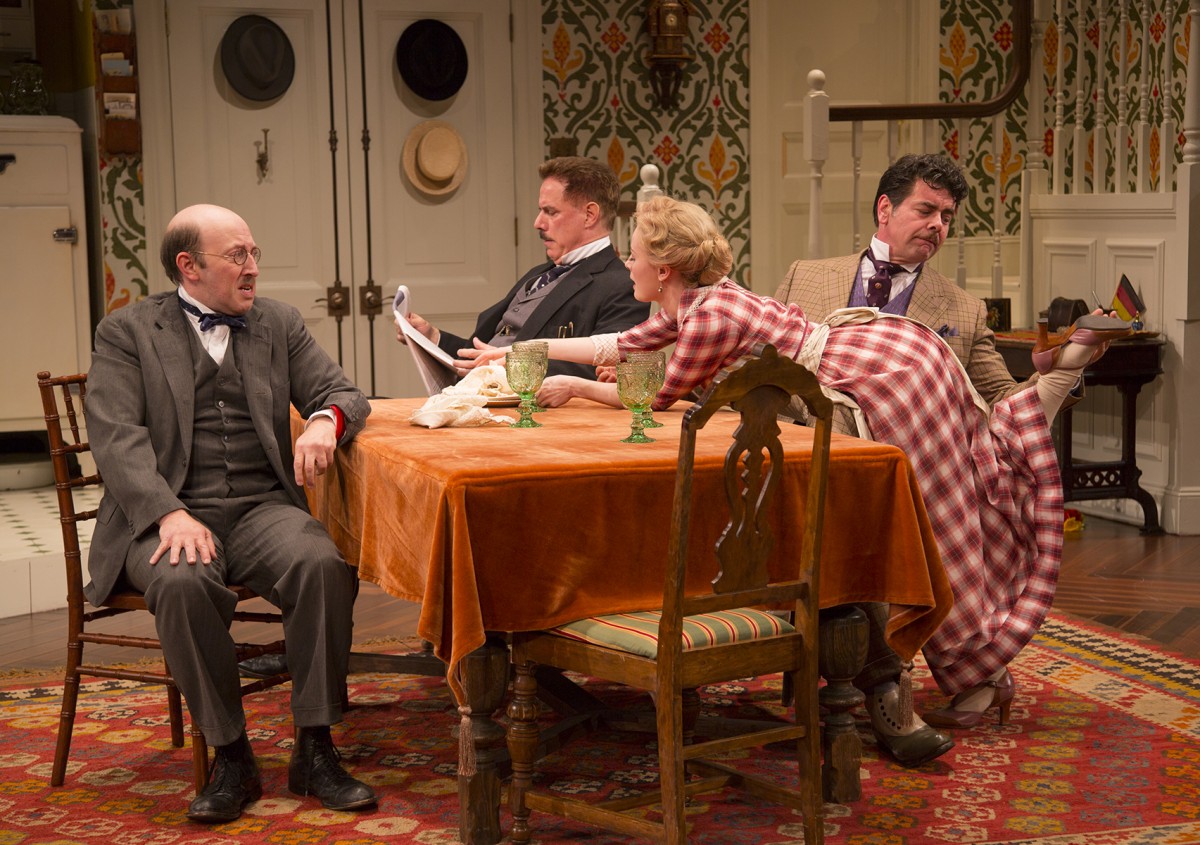Whether or not Louise Maske is hot to trot, her unpremeditated exposure of her underpants—sometimes called, rather anachronistically here, “panties”—while out to view the King on parade sets off the comic shenanigans in The Underpants, famed comic Steve Martin’s adaptation of a 1911 play by Carl Sternheim. Louise, a fetching young woman married to Theo, doesn’t even know she’s repressed, but, due to a loose tie, her knickers drop to her ankles in public, exposing her to a certain kind of male attention lacking in her life before. She stoops—to take off the underpants—and conquers, sparking the riveted attention of a pair of bachelors: one, Frank Versati, a proudly unpublished poet ready to rhapsodize her into bed; the other, Benjamin Cohen, a nebbishy barber who wants to worship her underthings.

With the well-timed intrusions of Gertrude Deuter, the nosy upstairs neighbor playing the part of eager duenna, we’re given a farce where cuckolding the self-possessed and rather clueless bourgeois husband is a comic given. Or, almost. In the end, the play is about the elasticity of marriage rather than the elation of adultery: the men who show up, beckoned by a glimpse of bloomers, are no better than the callous father-figure husband who, after all, has set Louise up as a perfectly respectable middle-class Hausfrau.
The play’s situation is primarily an excuse for arch innuendo, for comic turns by a sparkling cast, for jibes at Germans and their notorious attitude toward Jews, and for the kind of situations that, in a Frenchman’s hands, would’ve resulted in spicier bedroom schtick. Martin throws in the occasional racy bit—mostly coming from Gertrude, an eager onlooker panting to live vicariously through her very beddable neighbor—and we do get to see lacy underpants that are less revealing than a pair of boxers. To the extent that there’s an idea behind it all, it seems to be that our objects of desire—those random occasions for our libidinal spikes and fetishistic fervor, some even quite famous—can be remarkably short-lived, whereas baby-making, when all’s done, is what the fuss is inevitably about. Family values—“a man’s got to take care of someone”—and all that. Martin, as the playbill points out, realized in writing his adaptation that the bourgeoisie are us—regardless of politics.
As Louise, Jenny Leona is perfect. She’s cute, lively, demure but not dumb, not easily cozened, but willing to stray. It’s a performance so natural you have to stop to think about how badly it might be done. What director Gordon Edelstein gets across is that this blonde bombshell can be both the “angel in the house” that stands behind her man, as well as the object of those looking for a “geile Hausfrau.” The men are another matter. All clearly no match for her, or for Gertrude’s sense of possibility, we get to laugh at all of them, and each for a different reason.
Jeff McCarthy as Theo Maske is overbearing in that oblivious manner of the manly male. His wife is one of the things in his possession, not really a partner. As played here, he’s not really despicable, nor really hopeless. He’s the man of the house and the man Louise married, for better or worse, as the saying goes, and she (and we) might be forgiven for thinking he might get better. To Frank, played with pompous self-regard by Burke Moses, Louise is a source of inspiration—his best scene is when he lights her fire only to rush off to pen some lines, inspired by a conquest he never consummates. Much of the really funny stuff falls to Steve Routman as “Cohen with a K,” who gets to present us with the caricature that might be nearest Martin’s heart, or maybe it’s just a tribute to the kind of schlemiel and ambivalent Jew—humming Wagner and wondering aloud how anyone who cites Herder or Schiller could ever be less than humane—that Woody Allen established himself playing early in his career.
Routman’s rubber-legged departure after swallowing a sleeping draught is great fun, as is his slide across stage on a pillow while clutching a mirror to see up his hostess’s dress. The other comic standout is Didi Conn’s Gertrude, playing up moments like fanning her pelvis with the refrigerator door—after Theo turns her on—or miming a husband “doing his job.” It’s a role that requires charm to avoid crudity, and Conn certainly charms the audience.
Indeed, charm is a large part of what makes the Long Wharf production work. Start with Lee Savage’s set, with the Old World charm of its kitchenette, its double-door perfect for well-timed entrances and exits, its stairs and settees begging for the kind of physical comedy Edelstein’s production showcases. Jess Goldstein’s costuming—including Louise’s stripped-for-fun period underclothing, a pair of German flag underpants, and Kaiser regalia—is bright and eye-catching, and the play’s timing mostly on point.
A bit understated, perhaps, The Underpants is a brisk and benign evening of fun. “That’s where the danger lies. Under,” opines Theo early in the play, certainly a worthy thought in the play’s Freudian era, but, despite gestures to Nietzsche and Einstein, The Underpants, though willing to catch its characters with their pants down, and even off, doesn’t give any character the wherewithal to get down to it.
The Underpants By Steve Martin Adapted from Carl Sternheim Directed by Gordon Edelstein
Set Design: Lee Savage; Costume Design: Jess Goldstein; Lighting Design: Robert Wierzel; Wig and Hair Design: Charles LaPointe; Fight Consultant: Tim Acito; Production Stage Manager: Melissa M. Spengler; Assistant Stage Manager: Amy Patricia Stern; Assistant Stage Manager: Kelly Hardy; Casting: Calleri Casting; Photographs: T. Charles Erickson
The Long Wharf Theatre October 16-November 10, 2013





